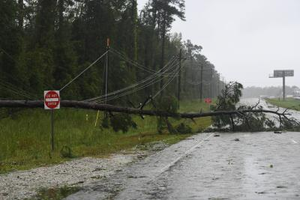America
FEMA Under Scrutiny as Hurricanes Milton and Helene Approach Amid Ongoing Disaster Response Efforts

October 9:
The Federal Emergency Management Agency (FEMA) is already struggling due to budget cuts, a political misinformation campaign, and its history of ineffectively responding to hurricanes of this magnitude; the addition of hurricanes Helene and Milton is just adding to the agency's problems.
On October 8th, as it continued its slow march via the Yucatán Peninsula in Mexico and into the heavily populated Tampa Bay area in Florida—which was still recovering from the devastation caused by Hurricane Helene just two weeks ago—Hurricane Milton intensified.
American citizens can turn to the Federal Emergency Management Agency (FEMA) for assistance in the days leading up to, during, and after natural catastrophes such as hurricanes, tornadoes, earthquakes, and floods.
The agency's handling of Hurricane Katrina in 2005 severely damaged its credibility, and since then, it has battled to recover. According to its website, FEMA's workforce can increase from 20,000 to over 50,000 active members in the event of significant disasters. It is able to coordinate resources from all throughout the federal government and has ten regional offices.
In 2004, it was formally incorporated into the Department of Homeland Security, having been established in 1979. There have been sixteen emergency declarations and eleven significant catastrophes that FEMA is assisting with at the moment. Only nine percent of its emergency response personnel are available for Milton, according to its daily operations briefing.
On Tuesday, FEMA Administrator Deanne Criswell stated that the agency was ready to assist anybody affected by Milton. She said that FEMA can assist immediate needs by reassigning staff from its longer-term recovery offices, among other staffing choices. Criswell added that the agency can use DHS's "surge capacity" to recruit personnel from other divisions inside the department. "We have these layers of staffing models because we know that we are going to have to face multiple events at once, just like this," she told the news network.
On October 2, Alejandro Mayorkas, the secretary of homeland security, informed reporters that FEMA would not be able to handle the upcoming hurricane season (June–November) due to a lack of financing. Last week, a group of senators from areas in the United areas that are expected to be hit by storms wrote a letter to Senate leaders, highlighting the urgent need to provide FEMA with more funding before the year ends. No sooner than the November 5th election would Speaker Mike Johnson rule out the possibility of reconvening the House of Representatives under Republican leadership in order to increase resources for emergency assistance.
Hurricane victims are receiving money from FEMA's disaster relief fund, which received $20.3 billion for the current fiscal year from Congress. The Biden administration, however, has asked the agency to spend the funds more quickly than expected due to the seriousness of the recent disasters.
Along with actual catastrophes, the organization has also had to deal with numerous unfounded allegations over the utilization of its funding.
The Democratic presidential contender, Kamala Harris, and former president Joe Biden allegedly utilized national emergency funds to assist individuals in the nation unlawfully, according to Trump and his Republican associates. The weather is under official control, according to U.S. Representative Marjorie Taylor Greene.
In an effort to put a stop to the numerous unfounded claims made about FEMA, the agency has created a rumor response page on its website. One entry deals with the worries about distractions: Supposedly, FEMA disaster response funds were redirected to address border-related or international matters. Truth: That's not the case. Disaster response needs are not being diverted in any way. The Disaster Relief Fund is a special portion of FEMA's budget that is used for disaster response and individual aid. No other, non-disaster related endeavors have been funded out of the Disaster Relief Fund.
A number of hurricanes, most notably Hurricane Maria in 2017 in Puerto Rico, have resulted in the United States disaster agency receiving harsh criticism for its inadequate emergency responses. Locals felt that then-President Trump was inept in his public statements after the devastation of U.S. territory became apparent and in his delay to send relief during Hurricane Maria.
Parts of New Orleans were inundated in 2005 as Hurricane Katrina pounded the city, forcing citizens to rush into unprepared shelters. Hurricane Katrina killed over 1,800 people and wreaked havoc on the coast of the Gulf of Mexico. In addition, FEMA's image took a major hit because of the severe criticism it received for its reaction.





































